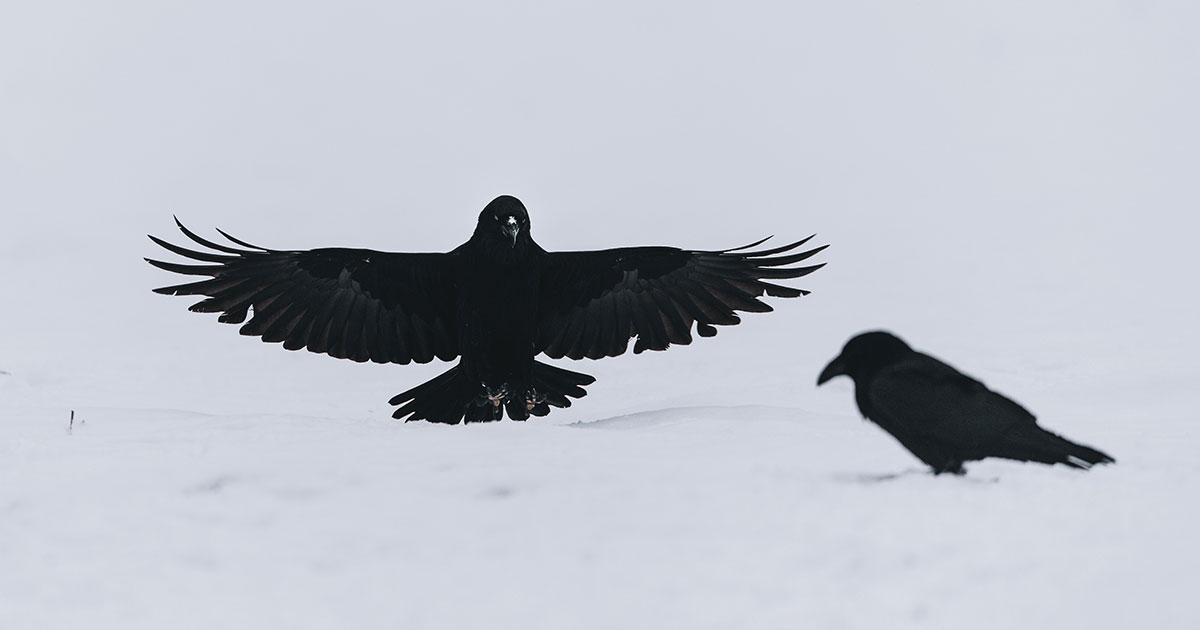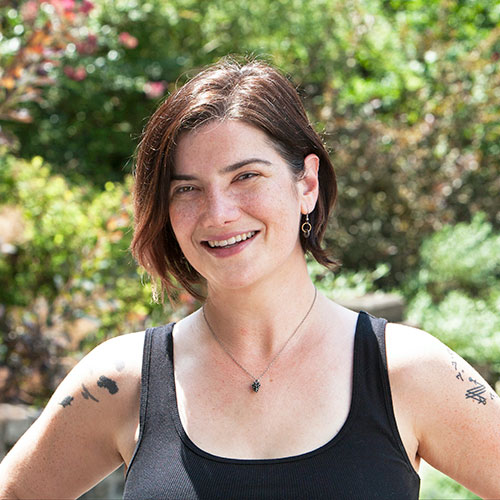CENTER STAGE
★ ★ ★ ★
DARLA HIMELES

Image by Niklas Veenhuis
Chino, California
Between the outer and inner fences,
two crows claw down to cement—
beaks like swords, backs slick,
slashing wings and talons.
I watch them fight from my car today
as I watched my parents as a child: clutching
a book in my lap. I cannot read
the crows or my father, for whom I wait
in my locked car, his bag of belongings
in the back seat beside the maps I printed
to find him. At once, a line cuts
from one building to another: orange
jumpsuits shocking under smoggy, industrial sky.
I pinch my lip, examine their faces, their gaits.
Not my father, not my father—maybe? No,
not my father.
Hours pass, the crows disperse.
The prison yard empties.
Two hours after the designated release, a small
group of men gathers at the gate.
Escorted by officers, they wear stiff beige chinos,
white canvas loafers, and baggy T-shirts
to greet the other side. I see him
shaking his gray head to an officer: No,
there’s nobody here for me—must be a mistake—
Sir, I need the bus fare you promised me.
“Chino, California” first appeared in New Ohio Review before appearing in Cleave (Get Fresh Books, 2021)
American As Apple Pie
Each autumn migrant laborers still handpick most apples, two or three per hand, dozens of handfuls per minute, Spanish ballads & mariachi dancing the leaves. Our only native variety, the crabapple, attracts no such music. No metaphor can undo this. Apples belong to the rose family, their blossom Michigan’s state flower. All 50 states grow apples now, over 2,500 varieties. When we slice apples for our children, we cut out the seeds. A person named Isaac cuts apple seeds from red delicious, most boring & popular of American apples, for his sons & young daughter in El Paso as you read this. His trunk bends over paring knife, soap-cleaned fingers, bland flesh with garish skin. He knifes the seeds from each slice in a smooth crescent like his father did & his grandmother, all born in Texas. The onyx seeds he tosses in the trash with some flesh still attached. He sits down with the slices & his children day after day, a ritual before work at ICE, where sometimes his boss assigns him to cut children from parents, throw them in separate cans, kick their heads in, witness a child deliver a stillborn child, here, in Texas, in the United States, after hours of her unanswered cries. No metaphor can undo this. You would not say Isaac “lost” the seeds, even after his wife hauled the garbage bag to the alley garbage bin, even after the garbage carrier dumped the bin’s contents into the trash compactor, even when the truck slid the compacted trash into the landfill, even when the city draped the landfill with sod, even after the landfill seeped into the soil. You would say Isaac threw them away.
“American As Apple Pie” first appeared in Cleave (Get Fresh Books, 2021)
Clip
Darren, age three,
spins nickels
on the parquet floor
in big wobbly circles,
as I, age six, build
castles out of Vanessa’s
baby bottles. Nickels
flick from his fingers
mechanically, their
sound smothered
under Dad’s curdled
curses, Mom’s loud
whispers, sudden
screams. I turn
finally from his
nickels, my castle,
find my mother
crouched, head
clutched, heaving,
my father gripping
a fist of her
now-detached
hair—a blond nest
he shakes, threats still
streaming from his
cracked voice.
Turning back,
I lunge to where
Darren plunges
a nickel into his wet
mouth, face darkening
to violet—Mom’s
shaking him
upside down,
Dad’s slapping
his back, when
the nickel tumbles
through spit
to the floor.
“Clip” first appeared in Cleave (Get Fresh Books, 2021)
—Q&A with poet Darla Himeles
Describe your “writer-self” in three words.
Tender, urgent wondering.
What is the most challenging aspect about writing for you?
Finding adequate time—not so much for writing itself, which I have always snuck into the crevices of my life, but for the broader big-picture work of laying out the unpublished poems to see if one or more books might be there, and the work of collecting essay ideas and fragments and complete drafts into an essay collection. Maybe it’s not time so much as conceptual space. The poet Emilia Phillips recently posted an image of a current writing project being arranged on clotheslines, and maybe that’s the thing I need: a tactile, spatial tool that can help me hold, see, and think.
Where, when and how are you inspired to write?
In trains and on planes; alone (anywhere) with a few books of poems and a notebook or laptop and at least 15 minutes; lounging next to my beloved anywhere; or during an insomniac night, on my phone. I’m nudged toward writing by reading (anything), films, art, long walks, time in nature (especially by water), heartbreak, and a particular kind of tenderness that feels like a thumbprint to the center of my chest. Sometimes my toddler says something accidentally profound, or profoundly true, and it leads me to a poem.
What are you reading right now?
I’ve been reading new memoirs by queer women: Abby Wambach, Glennon Doyle, Brandi Carlile, Megan Rapinoe. I also periodically read Runner’s World magazine, cover to cover, and I’m in one of my phases with that right now. Too, I’m reading Patrick Rosal’s astonishing free-of-charge book Atang: an alter for listening to the beginning of the world; Pine by Julia Koets; and Lace & Pyrite: Letters from Two Gardens by Ross Gay & Aimee Nezhukumatathil, which is newly re-released by Get Fresh Books.
Best piece of writing advice you’ve received?
Joan Larkin, “Don’t stop.” JC Todd, “You are a poet even when you are not writing.” Maxine Kumin, “A good poem needs furniture.” These are all paraphrases.
If you could tell your younger writer-self anything, what would it be?
You don’t need permission, invitations, awards, or acceptances. You need community. Trust the voice within that needs to make simple, brave declarations as soundly as you trust the music that leads you through the line. It won’t always take you 30 drafts, but sometimes it still will: be patient. Write the truth and then decide whether to publish; don’t decide the latter before the former is complete. And don’t censor yourself out of the poem. If it’s a gay poem, let it be gay. If it’s a poem you “shouldn’t be writing,” either decide to write it for real or try to dance it out of your limbs somehow. (You’ll still end up writing it eventually, of course.) Finally, when Adrienne Rich comes to your college to read, do not choose a forgettable night with your boyfriend over the reading: tell him, “This is the most important thing in my life,” and go.
Which poet or character from a book/movie would you invite to dinner and why?
Sappho. I’d ask her to come early to help me and my wife prepare the meal, and we’d sliver vegetables for a huge salad and lay out a tray of olives and cheese on the coffee table and sip wine and gossip about what the published fragments of her poems leave out. We’d braid each other’s hair and toss olives and feta into each other’s mouths while our toddler serenaded us with whatever toy instrument she happened to have on hand. We’d sing Indigo Girls songs, and Sappho’d sing poems back to us, and the night would be a delicious secret we’d all never tell a soul about.

Darla Himeles (she/her) is a Philadelphia-based poet who was raised in Dallas and Los Angeles. A Pushcart-Prize and Best-of-the-Net nominee, Darla can be read in recent and forthcoming issues of Lesbians are Miracles, Orange Blossom Review, The Massachusetts Review, The Night Heron Barks, New Ohio Review, and NAILED. Darla holds an AB in English from Bryn Mawr College, an MFA in poetry and poetry in translation from Drew University, and a PhD in American literature from Temple University, where she works as the assistant director of the Temple University Writing Center. She is a poetry editor at Platform Review and the author of the chapbook Flesh Enough (Get Fresh Books, 2017) and the full-length poetry collection Cleave (Get Fresh Books, 2021). Find her on Instagram @darlahimelespoetry and at www.darlahimelespoetry.com. You can buy Cleave here.
























0 Comments